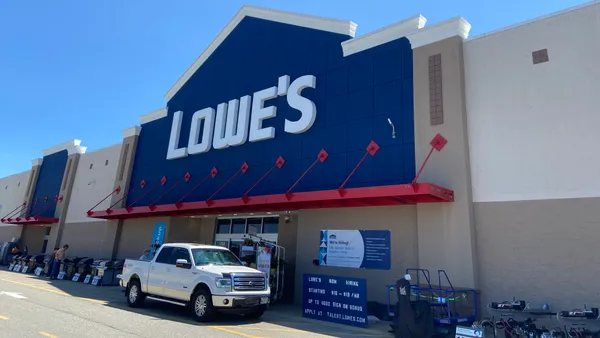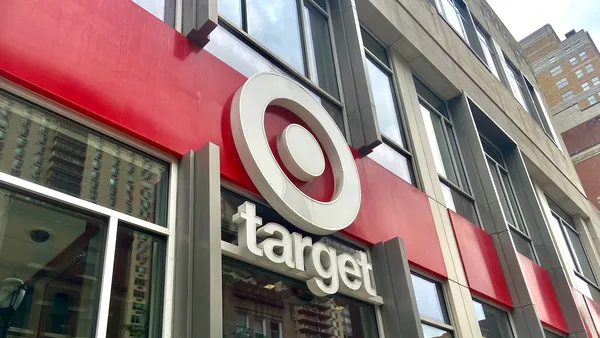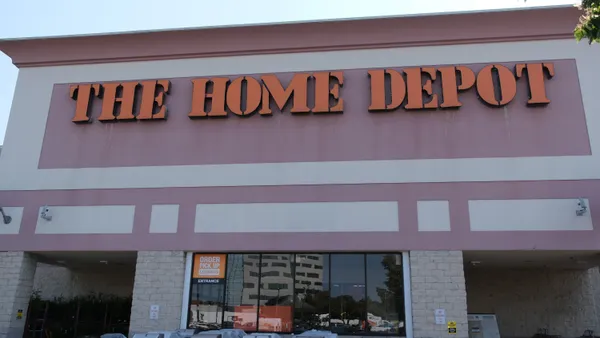Dive Brief:
-
With most stores reopened after closing due to the pandemic, Victoria's Secret weighed down L Brands in the second quarter, when net sales fell 20% to $2.3 billion. Bath & Body Works sales rose 13%, thanks to 191% growth in e-commerce, with sales at company-owned stores in the U.S. and Canada falling 23%. Victoria's Secret sales fell 39%, with sales at the company-owned stores falling 70% and e-commerce up 65%.
-
Store comps, which include e-commerce and just stores open during the whole quarter, rose 63% year over year — 123% at Bath & Body Works and 28% at Victoria's Secret. Store-only comps, which excludes temporarily closed stores, rose 33%, rising 87% at Bath & Body Works and falling 10% at Victoria's Secret. Gross margin expanded by 20 basis points, according to a conference presentation, with inventories up 11% year over year.
-
The company swung to a a $49.6 million net loss in the quarter, from net income of $37.6 million a year ago. Gross profit shrank to $711.5 million from $982.2 million last year, as operating income narrowed to $44 million from $174.6 million, according to a company press release.
Dive Insight:
Victoria's Secret's drag on L Brands is a familiar story by now, but L Brands in the second quarter made some progress in rectifying the situation.
The company reduced its selling, general and administrative expenses in the period by 28%, "driven by a reduction in store selling costs given store closures and a reduction in marketing expense." Despite the revenue decline in the quarter, the company boosted EBIT growth by 18%, by BMO Capital Markets analysts' measure. BMO Managing Director Simeon Siegel in emailed comments called that "positive proof that change is afoot."
The company's 20% revenue decline was in line with expectations, and analysts took it in stride. Some of the new slack was due to 210 permanent store closures at Victoria's Secret, which several analysts see as necessary short-term pain. On a conference call with analysts, executives said the store-closure program at Victoria's Secret is nearly complete, dependent on the outcome of ongoing negotiations with landlords of some locations.
The management of expectations paid off, as Victoria's Secret improved its margins in part by scaling back discounts, and as Bath & Body Works continued to enjoy a boom in sales of soaps and sanitizers.
"While we had appreciated the strength of [Bath & Body Works'] fundamentals and potential for momentum prior, its 2Q performance positions it to be among the strongest in the retail sector as it benefits from the strength of its categories in a Covid environment," MKM Partners Managing Director Roxanne Meyer said in emailed comments. "That said, we are also impressed by better than expected performance at [Victoria's Secret] and encouraged by initiatives that should support improving fundamentals off a low base."
L Brands continued to take care in setting expectations with the holiday approaching. With the pandemic ongoing and consumers wary, the period could be a disappointment for retailers this year. The company warned that "traffic constraints imposed by social distancing protocols in stores and capacity restraints in our direct channel distribution centers" could hurt seasonal volumes, which historically have been triple what an average week delivers in the second quarter. In a presentation accompanying its conference call, the company said it is "evaluating and testing ideas" to spread holiday volumes across a broader period of time by selling more in the third quarter.
Without providing many details, the company said it has taken key steps in its plan to separate its two banners, a project meant to unlock value in the Bath & Body Works personal care brand. CFO Stuart Burgdoerfer said work has been done to integrate shared functions into each brand, and at the end of the quarter hired Goldman Sachs and J.P. Morgan for advice on "a range of alternatives" in how the businesses might be separated.












